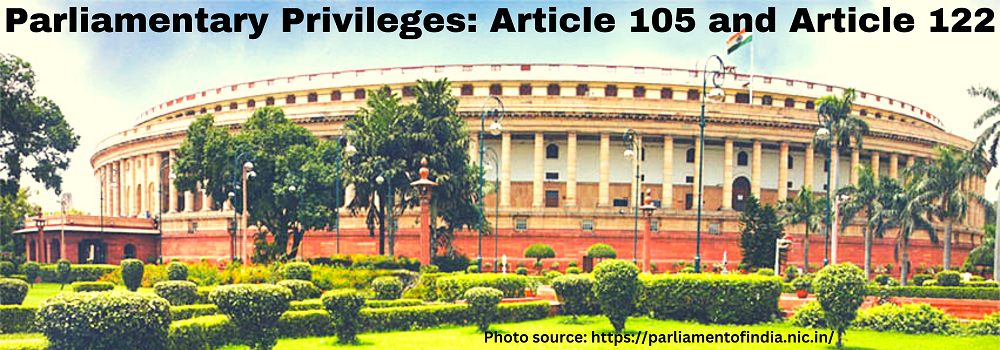28 Feb Parliamentary Privileges
Parliamentary Privileges
This article covers “Daily current events “and the topic is about ‘Parliamentary Privileges’ which is in news, it covers “Polity” In GS-2, and the following content has relevance for UPSC.
For Prelims: Parliamentary Privileges
For Mains: GS-2, Polity
Why in the news: The Parliamentary Privileges Committee, led by Deputy Chairman and JD(U) Member of Parliament Harivansh, was given a directive by Rajya Sabha Chairman Jagdeep Dhankhar to look into the “disorderly conduct” of 12 Opposition Members of Parliament that had resulted in numerous adjournments during the first leg of the Budget session.

Parliamentary Privileges
About Parliamentary Privileges
- The Indian Constitution’s Article 105 defines parliamentary rights. It includes all the Parliamentary privileges for every parliamentarian.
- The Indian Constitution’s Article 122 defines Courts are not allowed to look into Parliamentary proceedings
- Members of Parliament are not held liable in civil or criminal court for their words or deeds while carrying out their official duties.
- Only members of the house are eligible to use the Parliamentary privileges.
- The right to free speech and expression has been granted to parliamentarians under the rules of Parliamentary privileges.
Individual Freedoms Parliamentary privileges
- A citizen’s right to free speech and expression is distinct from a member of the parliament’s right to the same rights under Article 19(2).
- Even non-members with a voice in the house are granted Parliamentary privileges. For instance, the attorney general of India.
- Freedom from Arrest: Members are not subject to arrest in any civil matter for 40 days before and following the house’s adjournment, as well as when the house is in session.
- To prevent any interference with their ability to perform their duties, no member may be detained beyond the walls of the parliament without the consent of the house to which they are assigned.
- Freedom from Appearing Witnesses: Parliamentarians are granted special rights and are not required to testify in court. Without any interference from the court, they are given complete freedom to attend the house and carry out their tasks.
- Collective Freedoms: No one can be held liable for publishing any reports, conversations, etc., of the house under the authority of the member of the house, according to Article 105(2) of the Constitution.
- Exclude Strangers: The members of the house have the authority and right to prevent strangers and other non-members from participating in the proceedings. This right is crucial for ensuring fair and open debate in the house. If a breach is reported, a warning, reprimand, or even incarceration may be imposed as punishment.
- Breach of Privileges: The Indian Parliament has the authority to penalize anyone for violating its rules or showing a member of the house contempt. A member of the house is expelled from the home if they violate any rules.
- Regulate Internal Affairs: The Indian Parliament has the authority to penalize anyone for violating or showing contempt for the house, whether they are visitors or members of the house. If a member of the home violates any rules, that member gets kicked out of the house.
Freedom of the Press and Parliamentary Privileges
- The freedom of the press, which is a fundamental right, is constrained by parliamentary privileges. The press must exercise extreme caution when reporting on the behavior of any member of the parliament or its proceedings. There are some circumstances in which the press may be held in contempt of the house:
- Publishing any information on a member of the parliament’s character.
- Any early release of the proceedings.
- Misreporting or distorting the house’s proceedings.
- The proceedings’ portion that was deleted was published.
- The Parliamentary Proceedings (Protection of the Publication) Act of 1977 safeguards press freedom in the following situations:
- The reports of the events are mainly accurate.
- The information is provided unbiasedly.
- The report was created for the general welfare.
- A private meeting of the house should not be considered in the report.
Limitations of Parliamentary Privileges
- According to Article 118 of the Constitution, the right to free speech must be in compliance with the constitution and be subject to parliamentary norms and regulations.
- Parliamentarians are prohibited from discussing the actions of the judges of the Supreme Court and the High Court under Article 121 of the Constitution. Yet, even if it does, the court cannot get involved because it is a matter for the parliament.
- The member is not entitled to any immunity or other Parliamentary privileges for anything spoken outside the proceedings of the house.
Punishment for Violation of Parliamentary Privileges
- Imprisonment – If a significant violation has been committed, the punishment may include the incarceration of any member or person under the rules of the violation of parliamentary Privileges.
- Imposing Fine – The parliament may impose a fine on the person if, in its opinion, the breach or contempt was an economic offense and a financial gain resulted from the breach.
- Prosecuting the offenders – The parliament may also take legal action against the violator.
- The punishment given to its own members – The house must punish any contempt shown by members of the parliament, and the punishment may include suspension of the offending member from the house.
Source
Daily Current Affairs for UPSC
PLUTUS IAS CURRENT AFFAIRS 28th FEB 2023
The topic of current affairs described above is based on the Indian Polity and constitution. It talks about how Parliamentary Privileges under article 105 of the Indian Constitution impact Indian Constitution. Get such kind of the latest and best daily current affairs for the UPSC examination from Plutus IAS. Also, get weekly and monthly current affairs for the IAS exam preparation.




No Comments